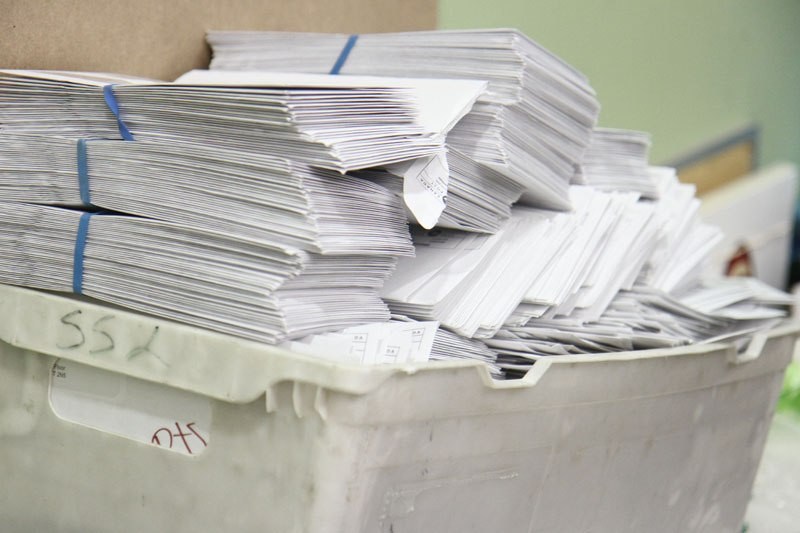Boxes are overflowing with stacks of collection notices for public intoxication fines inside Shelter House.
The number of fines that arrive at the south-side shelter's doorstep for people who are homeless surprised even Patty Hajdu when she became executive director last year.
"Literally, we have boxes and boxes of both tickets and then also all the collection notices that go into trying to collect those tickets from people that are, in some cases, the sickest amongst us, people that have severe, severe mental health and addictions issues that really have no capacity to either stop their drinking or pay these tickets," she said.
When homeless people are arrested and fined for public intoxication, they often give Shelter House as their address.
The paperwork is then mailed to the George Street shelter and added to the pile.
The system, which forces police officers to hand out the fines to people with no way to pay them, is designed to give an administrative response to a deep social problem and it isn't effective, said Hajdu.
"It's certainly not serving as a deterrent, which in my mind is likely what it was set up as years and years ago," she said, adding it's also creating a mountain of debt for people who are able to pull themselves out of poverty.
"It really isn't serving any purpose or the purpose it's intended to serve, which is really unfortunate because it seems very costly," Hajdu said.
In 2012, the Thunder Bay Police Service responded to more than 6,000 Liquor Licence Act offences and Const. Julie Tilbury said it is the highest call volume issue the police deal with.
"It is a regular occurrence. It happens daily, multiple times," she said.
When dealing with public intoxication calls, Tilbury said sometimes the police are able to release the person into the care of a sober person.
"However, with a certain segment of our population, we end up having to arrest them for being intoxicated in a public place and bringing them to a place of safety, which is usually the police station until they are sober," she said.
When that happens, the police have to do the paperwork that comes with it, which means issuing a fine.
A public intoxication fine is a provincial offences ticket and is $65.
Once the police have issued the fine, it is forwarded to the provincial offences office and it is the City of Thunder Bay's responsibility to collect the fines.
For some people, the fine is a wakeup call. For others, it will make no difference, said Tilbury.
"Their issues and substance abuse problems that they have are going to continue to direct the way they live their lives," she said.
When Mayor Keith Hobbs was a police officer, he said the policy was to ticket everyone that was brought in on a public intoxication charge and in the case of people that are homeless and struggling to survive, he doesn't think there's much that can or should be done when it comes to collecting on those fines.
"We're looking at the issue - poverty reduction. We're looking at our alcohol management program. I think those kinds of programs will hopefully get those people better and on the road to recovery," said Hobbs.
Municipalities in Ontario are owed millions of dollars in unpaid fines and the mayor said the city should look at going after the people who have the means to pay, but simply refuse.
"Those are the people they have to go after, not the people who can't afford the fine in the first place," he said.
"I think the answer probably lies with the police services board and the chief of police and put some discretionary things into place so that people who are down and out, who are visitors, frequent visitors, don't get ticketed maybe," Hobbs said.
Thunder Bay Police Chief J.P. Levesque said capping the number of fines a person can be issued isn't practical and city police officers already use discretion when dealing with intoxicated individuals by first bringing them to the city's detox centre, which is often full.
The only other option is the police station and that isn't ideal for anyone.
"We do not want intoxicated people in our cells. It's a risk for us as an organization. It's a risk for the individual; they should be in treatment or other place of safety," said Levesque.
Once someone is arrested and brought to the station, there is a process that has to be followed.
"If we're housing someone overnight, we've arrested them. We're keeping them. We're detaining them. There's got to be a process in place," Levesque said.
"Otherwise, if you had someone turn around and say 'I was arrested and I was never charged with anything' and they file a complaint, part of that complaint would be why did you arrest them...it's a due diligence issue."
The chief said when a person is issued a fine that compels them to go to court, a justice of the peace can order chronic offenders to go to treatment.
However, that's not an option in Thunder Bay because the city doesn't have anywhere deemed to be a treatment centre under provincial guidelines.
"There are answers to this. They don't necessarily lie with the police," said Levesque.
